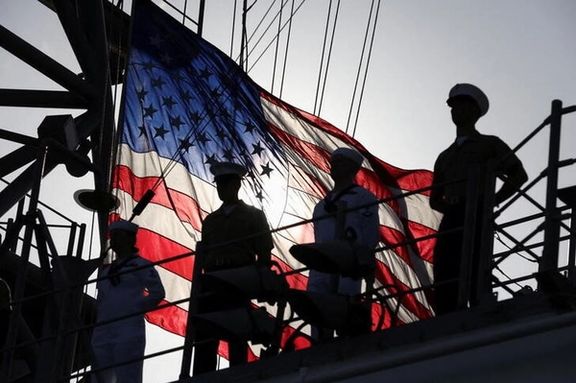US Doubts Iran’s Intentions As It Makes Secret Deals

As the United States has acknowledged a hostage release deal with Iran, the US Navy has repeatedly warned of threats to commercial shipping in the Persian Gulf.

As the United States has acknowledged a hostage release deal with Iran, the US Navy has repeatedly warned of threats to commercial shipping in the Persian Gulf.
"There is a heightened threat, a heightened risk to regional mariners in terms of seizures" by Iran in the strait, Commander Tim Hawkins, spokesman for the US Navy's Fifth Fleet said Wednesday.
A deal announced a week ago will see five US citizens held hostage in Iran to leave the country in exchange for the United States agreeing to release $6 billion dollars of Iranian funds frozen in South Korea due to sanctions.
The deal is said to be a first step to reduce tensions with Tehran, but the US Navy has been beefing up it forces in the Persian Gulf to prevent attacks by Iran’s Revolutionary Guard on commercial shipping, especially in the Strait of Hormuz.
"Right now, our focus is on … increasing our presence in and near the Strait of Hormuz to ensure security and stability in a very critical waterway," Hawkins told AFP at the US Naval base in Bahrain. This casts a shadow of doubt on the theory that tensions with Iran would ebb by a prisoner release in return for its frozen assets.

This is the second warning issued by the US Navy in less than a week, when a naval coalition in the region led by the United States warned ships to stay away from Iranian territorial waters.
"The International Maritime Security Construct is notifying regional mariners of appropriate precautions to minimize the risk of seizure based on current regional tensions, which we seek to de-escalate," Commander Timothy Hawkins, spokesman for the Bahrain-based US Fifth Fleet, said late on Saturday. The US Navy has deployed squadrons of F-16 and F-18 warplanes, more warships, and Marines to its forces in the region since early July, a sign of serious concern over Iran’s intentions.
However, multiple media reports indicate that the deal to release $6 billion from South Korea for the US hostages might be the prelude to more informal agreements between Tehran and Washington. In fact, the US has also agreed to Iraq releasing around $11 billion of Iranian funds frozen at its banks, and Japan appears to be the next country to release $3 billion.
The Biden administration on a track of secret talks to convince Tehran to perhaps put a temporary cap on its uranium enrichment, denies any informal deals.
The State Department without denying secret talks said, “we are not close to any kind of deal. We do not have any kind of agreement.” A spokesperson asked during a press briefing to categorically deny that there is an unwritten or informal understanding with Iran said, “Iran must first de-escalate to create any kind of space for future diplomacy. But at this time, we have – do not have any kind of agreement on any purported nuclear agenda.”
However, The Wall Street Journal reported August 11 that “Iran has significantly slowed the pace at which it is accumulating near-weapons-grade enriched uranium and has diluted some of its stockpile.” Also, if there were no secret deals beyond the release of hostages, the US would have hardly agreed to the release of $11 billion from Iraq and possibly more from Japan. Without a larger deal, the total amount would mean that the Biden administration paid more than $3 billion for each hostage, a historic ransom.
Whether Washington reached only a hostage deal with Tehran or a wider informal nuclear agreement, it knows that none of these means Theran has deescalated. Hence the warnings to commercial ships traversing the Persian Gulf.